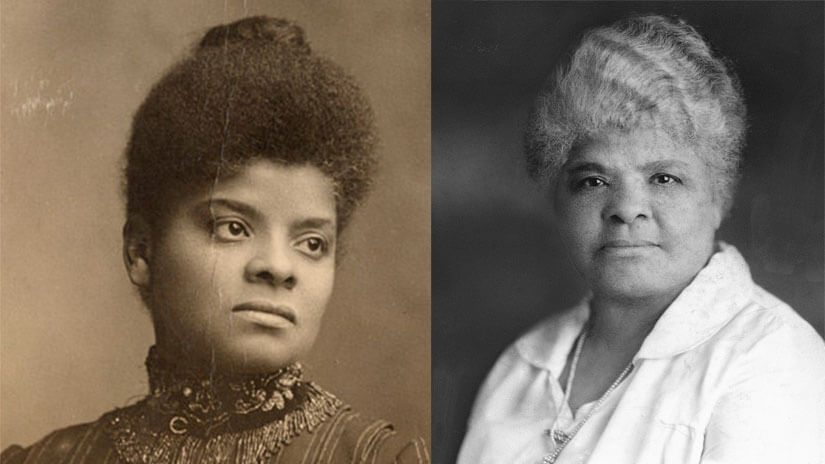It’s about time. On May 4, 2020, it was announced that Ida B. Wells Barnett had received a posthumous Special Citation Pulitzer Prize for journalism.
Wells had a much fuller life than can be described here. But several of her outstanding characteristics continue to appeal and inspire: the crusading journalist, savvy newspaper owner, piercing orator, organizer of tactical genius, pioneer of marriage equality and working mother –in short, a woman ahead of her time.
Born into slavery, freed by the Civil War a year later, she grew up in the period of Reconstruction when African Americans voted, held office and owned businesses and property. But with the revoking of the Civil Rights Act of 1875 those advancements morphed into Jim Crow, thus sharpening her political and journalistic zeal.
If indeed “the pen is mightier than the sword,” Wells knew that owning the pen – and the paper it writes on – was paramount for any kind of journalistic freedom. By the time she was 30-years old, she was the newspaper editor and co-owner of the Memphis Free Speech and Headlight. It was but one of many publications she started and it began the phase of her storied career devoted to anti-lynching investigative reporting.
The thorough way Wells conducted research and interviews, and her bold style of reporting earned her the title “Princess of the Press” from her peers in the mainstream (read white) media. Frederick Douglass, celebrated orator of his day, said his words were “feeble in comparison.”
Wells laid bare the trope that the defense of white women’s honor was justification for Southern white men getting away with murder. Wells saw that lynching was a terroristic ploy to dispossess her people of their land, wealth, property, freedom and safety. She theorized that white men were projecting their own history of sexual violence onto black men, making racial and gender discrimination inextricably linked.
Wells organized economic boycotts long before the tactic was made popular by other, mostly male, civil rights activists who often took the credit for its success.
She sued a railroad after she was dragged from a train car reserved for white women for refusing to give up her seat, then urged African Americans to boycott trains -72 years before the Montgomery Bus Boycott. She drew the wrath of Southern farmers and business owners when she toured the UK in 1893, encouraging the British to stop purchasing American cotton.
In the pen and sword department, Wells’ sword was her tongue. She did not suffer fools gladly. Despite her fame as a journalist and speaker, she was seen as too militant.
During WWI, she was placed under government surveillance as a dangerous race agitator. As her public influence ebbed, the voices of the more traditionally-minded Booker T. Washington and his rival W.E.B. DuBois grew ascendant, and at times she was shunned by her own.
Wells, a founder of the NAACP, accused DuBois of deliberately excluded her name from the official list. Mary Terrell, then president of the National Association of Colored Women’s Clubs, which Wells also helped found, gave in to pressure to exclude her from its 1899 Chicago conference. Later, Wells lost the presidency of National Association of Colored Women to the more diplomatic Mary McCloud Bethune.
In 1895, Wells married widower Ferdinand Barnett, himself a civil rights attorney, activist and journalist. Together they raised six children as their public interests also intertwined. Barnett recognized his wife’s prolific abilities and supported them by taking on more of the child-rearing – a rarity in those times – while she wrote, published, traveled and spoke.
So what would Wells be writing and speaking about today?
Her anti-lynching crusade would continue as a campaign against the shooting of African American men.
She would be insisting on greater structural support for working parents to be able to better share the load of caring for their families.
She would parse the differences between feminism by gender (all women) and by race (women of color) toward advancing the presence of the latter in high office and using our clout more effectively in leveraging the national economy as well.
She would untangle the weave of protest from those equating easing the pandemic restrictions with the “freedom” to return en masse to stores, restaurants, offices and public transportation, to reveal the threads of inherent racism that puts those already at highest risk of dying -black and brown workers – in increased numbers on those front lines.
She would marshal the people’s collective resistance to injustice using the tools of modern media toward direct action, careful not to confuse visibility on the internet with actual political power.
And she would have won a Pulitzer a long time ago.
Note:
Congratulations also to Nikole Hannah-Jones on winning a Pulitzer Prize for her Commentary in the New York Times Magazine’s series, The 1619 Project. As its official education partner, the Pulitzer Center has connected curricula based on the work of Hannah-Jones and her collaborators to some 4,500 classrooms since August 2019.






